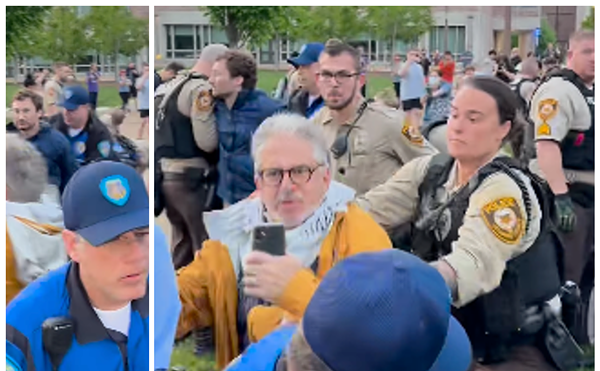Exactly what is this new dance? It's a law-enforcement maneuver that temporarily sidesteps the so-called Miranda warning: A police officer intentionally delays informing a suspect of his or her rights, extracts a confession, then recites the Miranda warning and has the suspect confess a second time. That's precisely what Rolla police officer Richard Hanrahan did back in 1997, and in December, in a potential landmark ruling, the U.S. Supreme Court will decide whether the procedure passes constitutional muster.
Judging from court records, the events that gave rise to the underlying case are convoluted -- and ugly. On February 12, 1997, Patrice Seibert's twelve-year-old son, Jonathan, died in his sleep in the mobile home where the family lived. Seibert feared that she'd be accused of neglecting the boy, who was seriously disabled from cerebral palsy. Two of her teenage sons, along with two of their friends, hatched a plan to cover up the death by setting the mobile home on fire. Not wanting it to look as though the disabled boy had been left alone, they decided that seventeen-year-old Donald Rector, who also lived with the family, would have to perish in the fire as well. One of the perpetrators, Seibert's seventeen-year-old son Darian, failed to escape from the trailer in time and suffered serious burns.
After the fire Seibert was informally interviewed by Officer Hanrahan on two occasions. Both times, she denied that she'd played a role in the plot. But Phelps County authorities didn't believe her, and according to testimony at the trial, the county prosecutor instructed Hanrahan to "make a case" against Seibert. On February 17, St. Louis County police arrested Seibert while she was visiting her son in the burn center at St. John's Mercy Medical Center.
At Hanrahan's behest, the arresting officer did not advise Seibert of her rights but simply took her into custody. She subsequently confessed to Hanrahan that she had known about the murder plot. With a tape recorder rolling, the Rolla officer then read Seibert the Miranda warning and elicited a second confession.
Over the objection of her St. Louis-based public defender Beth Kerry, Seibert's second confession was admitted as evidence at her trial. Seibert was convicted of second-degree murder and sentenced to life in prison. Then last December the Missouri Supreme Court reversed the conviction. Ruling 4-3 that the confession should have been suppressed, the court sent the case back for a new trial.
In the majority opinion, Judge Michael Wolff asserts that Hanrahan's maneuver "was undeniably an 'end run' around Miranda." Wolff notes that interrogators are taught that getting the first admission from a suspect -- also known as the "breakthrough" or "beachhead" -- is the hardest part. "Officer Hanrahan's intentional omission of a Miranda warning was intended to deprive Seibert of the opportunity knowingly and intelligently to waive her Miranda rights.... Were police able to use this 'end run' around Miranda to secure the all-important 'breakthrough' admission, the requirement of a warning would be meaningless. Officers would have no incentive to warn, knowing they could accomplish indirectly what they could not accomplish directly."
Judge Duane Benton, writing for the dissenting judges, invokes a 1985 case, Elstad v. Oregon, in which the U.S. Supreme Court excused an officer who accidentally failed to recite the Miranda warning. The suspect confessed, the officer read him his rights, the suspect confessed again. The court ruled that the confession could be admitted as evidence. In that case, the majority dismissed as "apocalyptic" Justice William Brennan's dissent that they'd just given officers an incentive to interrogate without a warning.
Wolff also mentions Elstad in his majority opinion, arguing that the court never envisioned that an officer would purposefully neglect to inform a suspect of his rights.
Officer Richard Hanrahan testified during a hearing in the original case that he intentionally did not advise Seibert of her Miranda rights in order to elicit a confession. He learned this method, Hanrahan said, at an institute that promoted the technique; his police department and all the others where he has worked subscribe to the training, he added.
"Basically, you're rolling the dice," Hanrahan testified. "You're doing a first stage where you understand that if you're told something, that when you read the Miranda rights, if they invoke them, you can't use what you were told. We were fully aware of that. We went forward with the second stage, read Miranda, and she repeated the items she had told us."
In its petition asking the U.S. Supreme Court to reverse the state high court's decision, the Missouri Attorney General's Office claims that John E. Reid and Associates, a Chicago-based institute that offers interrogation seminars in Kansas City and St. Louis, teaches the two-step approach in its courses. The company denies advocating the technique.
In a brief submitted to the U.S. Supreme Court in August, the Attorney General's office argues that Elstad allows the Two-Step, and that based on "the totality of the circumstances," the confession was properly admitted into evidence.
Oddly, five months earlier, the March issue of "Front Line Report," a newsletter published by the Attorney General's Office and distributed to state law enforcement agencies, warned that the two-step technique is based on "faulty advice" that resulted from a misreading of the Elstad decision. "Elstad does not authorize po-lice to intentionally withhold giving Mir-anda warnings to an arrested suspect so the suspect will 'loosen up' and confess," the newsletter reads.
A spokesman for the Attorney General's Office de-clined to comment on the case.
Jay Nixon's office isn't alone in standing up for the Two-Step before the U.S. Supreme Court. U.S. Solicitor General Theodore Olson, who reports to John Ashcroft in the Department of Justice, filed a brief supporting the state, citing Elstad as precedent. If the Missouri Supreme Court's ruling stands, Olson argues in his brief, then judges in every case that involves a confession will have to decide whether failing to give a Miranda warning was accidental or intentional.
Olson raises another specter. "And a rule that sought to deter questioning without warnings overlooks that officers might appropriately question a suspect, without administering warnings, in some situations -- such as when it might help locate a kidnapping victim, or thwart a terrorist attack," the Solicitor General writes.
Amy Bartholow, a state public defender, calls the Olson's argument a "red herring." The U.S. Supreme Court, she says, has already approved a public-safety exception to Miranda that would apply in such instances. In Seibert's case, Bartholow asserts, "There wasn't any sort of ongoing crime that could have been stopped."
In her own brief, Bartholow writes, "This case presents a direct assault on Miranda v. Arizona.... Hanrahan knew that Miranda and its progeny obligated him to advise Seibert of her rights prior to any questioning. He nevertheless withheld what the law demands, seeking to extract a statement. Hanrahan 'rolled the dice,' betting that judges would look the other way. Missouri has now upped the ante, asking this Court to erase one of Miranda's key holdings and make the mandatory warnings optional."
Aligned with Bartholow are the American Civil Liberties Union and a group of former law enforcement officials that includes former FBI director William Sessions and two former Justice Department higher-ups. "We have worked within Miranda's warning re-quirement on a daily basis and have found it not to be a barrier to effective law en-forcement and prosecution," the latter group writes in its brief, arguing that a decision in favor of the Two-Step "would erode the public's trust in law enforcement, and lead to disrespect for the law and its institutions."
Three years ago, the group notes, the Supreme Court overturned a federal statute that would have allowed interrogations without first providing Miranda warnings. That statute also provided for a totality-of-circumstances test a judge could use to decide whether a confession should be admitted at trial. "If Congress could not pass a statute that dispenses with Miranda's warning requirement, officers should not be permitted to disobey Miranda's commands and achieve the same result."





